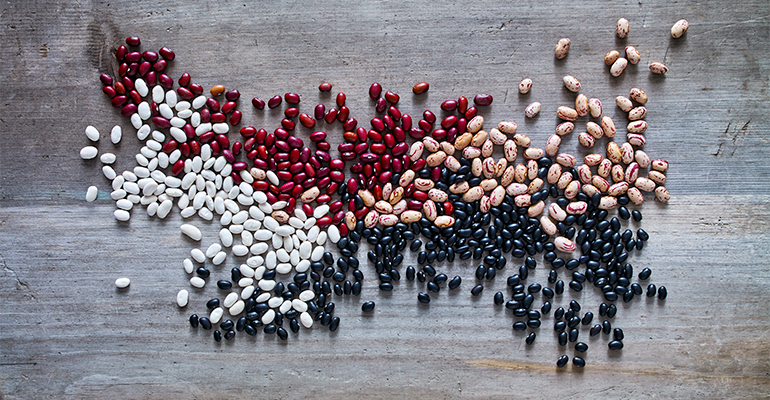News
How alternative proteins could transform US agriculture and restore natural ecosystems
30 Aug 2024As the US seeks new strategies to meet its environmental targets, a recent report from the Good Food Institute (GFI) and Highland Economics highlights the potential of alternative proteins to drive significant progress.
The report, Transforming land use: Alternative proteins for U.S. climate and biodiversity success, suggests that a shift towards plant-based, fermentation-derived, and cultivated proteins could play a crucial role in addressing the nation's climate and biodiversity challenges.

Unlocking land for restoration
One of the key findings of the report is the potential to free up 47.3 million acres of cropland by substituting 50% of animal-based proteins with alternative proteins. This area, which is about the size of South Dakota, could be restored to natural ecosystems, significantly aiding the conservation of 139 threatened US ecosystems — which represents 64% of all currently endangered ecosystems in the country.
This approach aligns with broader national and global conservation goals, including the US commitment to conserving 30% of its lands and waters by 2030. By repurposing this vast amount of land, the US could make substantial strides in achieving these conservation targets and enhancing its natural habitats.
Climate mitigation through carbon sequestration
The report also emphasises the climate benefits of this land use transformation. Restoring the 47.3m acres could lead to the sequestration of approximately 177.8m metric tons of CO2 equivalent annually. This amount surpasses the combined carbon emissions from all domestic flights in the US, highlighting the significant impact that alternative proteins could have on reducing national carbon emissions.
Such a shift would increase the national carbon sink — anything that absorbs more carbon than it releases — by 22%, making it a vital component of the US's broader climate strategy. By improving agricultural practices and reducing reliance on land-intensive animal-based proteins, the adoption of alternative proteins could play a critical role in mitigating climate change.
Aligning with global sustainability trends
The recommendations of the GFI report resonate with global movements towards sustainable and regenerative agriculture. There is a growing trend among consumers to adopt diets that reduce meat consumption in favour of more sustainable alternatives. Known as "climatarians," these consumers are increasingly choosing plant-based and other alternative proteins to lower their environmental impact.
This shift is part of a broader effort within the food industry to embrace sustainability. Recent discussions at Fi Europe 2023, for example, highlighted how regenerative agriculture practices, precision fermentation, and the use of upcycled ingredients are driving innovation in the sector. As consumers demand more sustainable and ethically produced food, the adoption of alternative proteins is expected to grow, further integrating sustainability into mainstream food production.
Economic and social dimensions
The transition to alternative proteins also has significant economic and social implications. The report calls for increased public investment in research and development to advance these technologies, which could open up new market opportunities for US farmers. As the food industry faces ongoing challenges related to affordability, there is a growing demand for alternative protein products that are both cost-effective and sustainable.
This shift could help diversify income streams for farmers, providing resilience against the volatility of traditional agriculture. Moreover, as consumers increasingly prioritise affordable and sustainable food options, alternative proteins, if priced on par with conventional meat, are well-positioned to meet this demand. The intersection of consumer demand, economic necessity, and environmental goals points to a future where alternative proteins play a central role in the US food system.
The findings of the GFI report highlight the potential of alternative proteins to help the US achieve its climate and biodiversity goals. By adopting these more sustainable protein sources, the US could make significant progress towards a more resilient and environmentally conscious food system, aligning with both national and global sustainability trends.
Related news

Future F&B flavours favour exploration and explosive taste profiles
25 Mar 2025
Exploration and experimentation will define the future of flavour, according to Mintel, as consumers seek out taste profiles and textures that offer an adventurous eating experience.
Read more
US wholesale egg prices plummet, but volatility remains
24 Mar 2025
Egg prices in the US fell sharply in March after supply improved – but risks from avian flu and other market factors keep long-term prices unpredictable.
Read more
Global consumers enjoy food less and perceive it as less healthy
20 Mar 2025
Enjoyment of food and its perceived healthiness is dwindling among most global populations, according to findings from Gallup and Ando Foundation/Nissin Food Products.
Read more
Seafood set to ‘dethrone’ poultry as protein growth king
19 Mar 2025
Seafood is poised to surpass poultry as the leading contributor to global protein supply growth this year, according to Rabobank’s latest protein outlook.
Read more
Scientists reveal new crop production ideas to overcome food shortages
13 Mar 2025
Researchers from the University of Illinois are exploring increasing Rubisco levels to enhance photosynthesis and elevate crop productivity.
Read more
Coca-Cola enters the prebiotic soda category
12 Mar 2025
Coca-Cola is leaning into nostalgia and the growing popularity of “gut-healthy” sodas to launch a line of prebiotic sparkling beverages.
Read more
Tariff volatility leaves food manufacturers in limbo
11 Mar 2025
Rapid US trade policy shifts and tariff escalations are creating uncertainty for food manufacturers and ingredient suppliers.
Read more
‘World's first’ precision nutrition system launched in UK
11 Mar 2025
Wellness provider Reviv Global is claiming a “world first” in the field of personalised health with the UK launch of its 10X Precision Health System.
Read more
‘Health’ labels on products reduce consumers’ willingness to pay
10 Mar 2025
A study into front-of-packaging “health” labelling finds that these labels alone can lower US consumers’ willingness to pay.
Read more
F&B industry hit with fresh greenwashing claims
26 Feb 2025
The food and beverage (F&B) industry is under fresh scrutiny amid claims of greenwashing, with Arla the latest company in the firing line.
Read more